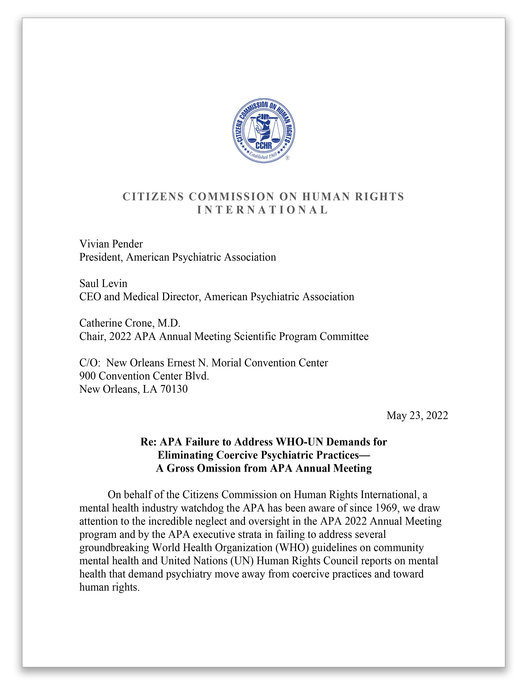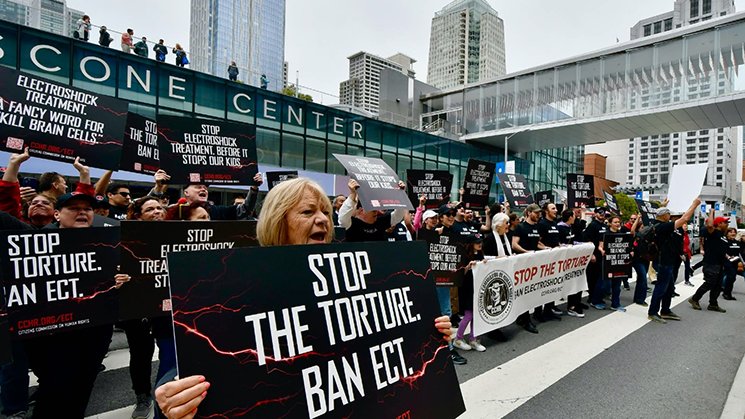CCHR’s ultimatum comes in the wake of almost a year of inaction by the APA following the release of a 10 June 2021 report by World Health Organization that condemned coercive psychiatric practices internationally. WHO stated that abusive psychiatric treatment practices such as unlawful or arbitrary institutionalization and overmedication “are pervasive and are increasingly used in services in countries around the world, despite the lack of evidence that they offer any benefits, and the significant evidence that they lead to physical and psychological harm and even death.”
WHO stated that abusive psychiatric treatment practices such as unlawful or arbitrary institutionalization and overmedication “are pervasive and are increasingly used in services in countries around the world, despite the lack of evidence that they offer any benefits, and the significant evidence that they lead to physical and psychological harm and even death.”
On the heels of the WHO guidelines, the United Nations Human Rights Council issued its report on mental health for 28 February–1 April 2022, which further condemned these human rights abuses.
Today 100,000 Americans are subjected to electroshock treatment each year, some victims 5 years of age or younger.
Despite continued public demand for reforms, the mental health industry has taken no action to bring an end to the abuses endemic to psychiatry.
“American psychiatry seems to have missed the memo,” said Jan Eastgate, president of CCHR International. “Involuntary commitment laws are being used to detain mental health patients for profit, and to forcibly drug, shock and restrain them. The system is only worsening and such abusive practices need to be stopped and eliminated.”
CCHR’S open letter
Re: APA Failure to Address WHO-UN Demands for Eliminating Coercive Psychiatric Practices—A Gross Omission from APA Annual Meeting

On behalf of the Citizens Commission on Human Rights International, a mental health industry watchdog the APA has been aware of since 1969, we draw attention to the incredible neglect and oversight in the APA 2022 Annual Meeting program and by the APA executive strata in failing to address several groundbreaking World Health Organization (WHO) guidelines on community mental health and United Nations (UN) Human Rights Council reports on mental health that demand psychiatry move away from coercive practices and toward human rights.
Your membership should be fully apprised of these as well as the World Psychiatric Association positioning statement from October 2020 that recognized coercion in psychiatry is “over-used,” contravening patients’ rights, including violations of “rights to liberty; autonomy; freedom from torture, inhuman or degrading treatment….”[1] Where is the similar APA statement?
In June 2021, WHO’s “Guidance on Community Mental Health Services: Promoting Person-Centered and Rights-Based Approaches,” condemns coercive psychiatric practices, which it says “are pervasive and are increasingly used in services in countries around the world, despite the lack of evidence that they offer any benefits, and the significant evidence that they lead to physical and psychological harm and even death.”[2] Coercion is “built into mental health systems, including in professional education and training, and is reinforced through national mental health and other legislation.”[3] [Emphasis added]
An interview with Dr. Dainius Pūras, a psychiatrist and former UN Special Rapporteur on a Right to Health, published in Psychiatric Times in June 2021, essentially put psychiatric organizations on notice: “I recognize the serious arguments of professionals who warn against a prohibition of forced treatment. They insist on retaining legal permission to treat individuals with serious mental health conditions involuntarily in exceptional circumstances in ways that preserve dignity and autonomy. However, these good intentions are failing.” Further, he said; “Coercive practices are so widely used that they seem to be unavoidable, but I suggest turning our thinking and action the other way around. Let us assume that each case of using nonconsensual measures is a sign of systemic failure, and that our common goal is to liberate global mental healthcare from coercive practices…. If we do not move in this direction, arguments for coercion will continue to be used, and misused.” [Emphasis added]
Systemic failure would be vital to discuss at an educational platform such as the APA Annual Meeting and, in ignoring it, reflects a support of involuntary detainment and forced treatment and a lack of accountability for inherent abuses so rife in the mental health system.
As Dr. Pūras stated: “If there is an agreement, even at the level of the UN Human Rights Council resolutions, that human rights violations remain widespread within mental healthcare systems, who is accountable? Accountability for serious harms is important, but I would opt for structural change. Structural change will guarantee that days of discrimination and human rights abuses are over, and that the harms will not be repeated.”[4]
What exactly is the APA’s plan for structural change?
Various United Nations Human Rights Council reports have for years supported this, the latest in February-April 2022, in which experts called for changes in mental health law to align with the Convention on the Rights of Person with Disabilities (CRPD). This should be whether a country/state is a signatory to the CPRD or has ratified it or not. The report addresses concerns that:
- Coercion, involuntary treatment and forced placement are incompatible with human rights. States should repeal provisions on forced institutionalization and end involuntary treatment practices.
- Countries need to move away from institutionalization and toward inclusion and the right to independent living in the community.
- There is an overreliance on mental health drugs which are a “significant obstacle to the realization of the right to health.”
- CCHR adds that many of these drugs have the potential to also instigate violent and suicidal tendencies.[5]
- WHO said that countries must ensure that “informed consent” is in place and that “the right to refuse admission and treatment is also respected.”[6] “People wishing to come off psychotropic drugs should also be actively supported to do so, and several recent resources have been developed to support people to achieve this,” according to the WHO Guidelines.[7]
- Dr. Pūras was also candid in saying that the dominance of the biomedical model has resulted in an overuse of medicalization and institutionalization. He warned against the exaggerated benefits of psychotropic medications and highlighted that their effectiveness is not comparable to other medicines that are essential for certain physical conditions, such as for example, antibiotics for bacterial infections. Further, there are no biological markers for mental health conditions. Hence the specific mechanisms by which psychotropic drugs might be effective, are simply unknown.[8]
- In November 2020, the UN Committee on the Rights of Persons with Disabilities reinforced the need for an absolute prohibition of involuntary placement and treatment of persons with disabilities under the CPRD. The Committee found that the use of forced treatment, seclusion and various methods of restraint in medical facilities, including physical, chemical and mechanical restraints are not consistent with the prohibition of torture and other cruel, inhuman or degrading treatment or punishment of persons with disabilities (article 15 CRPD).[9]
CCHR is bringing these matters to the attention of APA members and visitors to the annual meeting, also obtaining feedback on the failure of the association executives to issue a formal statement in support of the elimination of coercive psychiatric practices.
Sincerely,
Amber Rauscher
Legal Affairs & Policy
Citizens Commission on Human Rights International
[1] “Supporting and implementing alternatives to coercion in mental health care,” World Psychiatric Assoc., https://www.wpanet.org/alternatives-to-coercion
[2] “Guidance on Community Mental Health Services: Promoting Person-Centered and Rights-Based Approaches,” World Health Organization, 10 June 2021, https://www.who.int/publications/i/item/9789240025707 (to download report)
[3] “Guidance on Community Mental Health Services: Promoting Person-Centered and Rights-Based Approaches,” World Health Organization, 10 June 2021, p. 8, https://www.who.int/publications/i/item/9789240025707 (to download report)
[4] Awai’s Aftab, MD, “Global Psychiatry’s Crisis of Values: Dainius Pūras, MD, Psychiatric Times, 3 June 2021, https://www.psychiatrictimes.com/view/global-psychiatry-crisis-values
[5] Annual report of the United Nations High Commissioner for Human Rights and reports of the Office of the High Commissioner and the Secretary-General, 49th session, Human Rights Council, “Summary of the outcome of the consultation on ways to harmonize laws, policies and practices relating to mental health with the norms of the Convention on the Rights of Persons with Disabilities and on how to implement them,” 28 February–1 April 2022
[6] “Guidance on Community Mental Health Services: Promoting Person-Centered and Rights-Based Approaches,” World Health Organization, 10 June 2021, p. 6, https://www.who.int/publications/i/item/9789240025707 (to download report)
[7] “Guidance on Community Mental Health Services: Promoting Person-Centered and Rights-Based Approaches,” World Health Organization, 10 June 2021, p. 201, https://www.who.int/publications/i/item/9789240025707 (to download report)
[8] “The world must change the way mental health challenges are addressed, UN expert says,” UN Human Rights Office of the High Commissioner, 6 July 2020 https://previous.ohchr.org/en/NewsEvents/Pages/DisplayNews.aspx?NewsID=26039&LangID=E
[9] “Third Party Intervention in Relation to the European Court of Human Rights’ Advisory Opinion on Oviedo Convention,” November 2020, Written comments jointly submitted by: Autism Europe, European Disability Forum, Inclusion Europe, International Disability Alliance and Mental Health Europe






















